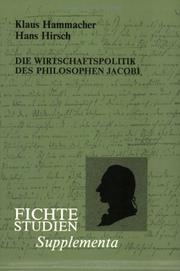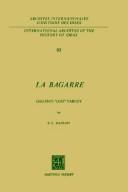| Listing 1 - 10 of 17 | << page >> |
Sort by
|

ISBN: 9004456252 9051834187 Year: 1993 Publisher: Amsterdam ; Atlanta, GA : Brill,
Abstract | Keywords | Export | Availability | Bookmark
 Loading...
Loading...Choose an application
- Reference Manager
- EndNote
- RefWorks (Direct export to RefWorks)
Friedrich Heinrich Jacobi (1743-1819), Philosoph und Schriftsteller, wirkte 1772-1779, bevor er mit dem Spinozastreit (1785/86) als Philosoph berühmt wurde, als Wirtschaftspolitiker in kurfürstlichen Diensten, und zwar als Hofkammerat und Geheimrat in den Rheinlanden (Jülich-Berg) und kurze Zeit in Bayern (1779). Aufbauend auf die Theorien der sog. Physiokraten, z.B. eines Turgot, und der Freihandelslehre Adam Smith kämpfte er, wenn auch mit bescheidenen Erfolgen, für einen von staatlicher Bevormundung freien Markt. Aufgrund bisher unbekannter Dokumente wird diese Tätigkeit minutiös rekonstruiert. Philosophisch eine nicht unbedeutende Komponente in der Ausbildung moderner Vertragstheorien, erscheint sie theoriegeschichtlich als ökonomische Leistung, die nachhaltig auf die Herausbildung moderner Wirtschaftsformen eingewirkt hat.
Economics --- Physiocrats. --- History --- Jacobi, Friedrich Heinrich, --- Physiocrats

Abstract | Keywords | Export | Availability | Bookmark
 Loading...
Loading...Choose an application
- Reference Manager
- EndNote
- RefWorks (Direct export to RefWorks)
Economics --- Economics --- Physiocrats --- History --- History --- Jacobi, Friedrich Heinrich,
Book
ISBN: 2130488706 9782130488705 Year: 1998 Volume: 96 Publisher: Paris presses Universitaires de france
Abstract | Keywords | Export | Availability | Bookmark
 Loading...
Loading...Choose an application
- Reference Manager
- EndNote
- RefWorks (Direct export to RefWorks)
Comment l'économie politique en est-elle venue à faire figure de science générale de la société au milieu du XVIIIè siècle en France ? C'est le problème que soulève l'émergence de la " science nouvelle " de François Quesnay et de son oncle (la Physiocratie). Pour le comprendre, il faut explorer les différentes dimensions de la " science nouvelle " et partir des rapports qu'elle entretient avec la pensée économique de son époque, avec la philosophie et avec les nouvelles formes du politique. La " science nouvelle " puise dans le fonds des débats et des réflexions sur l'activité économique (l'économie et la théorie du commerce), mais s'en détache très nettement en prenant au sérieux les exigences de scientificité que la philosophie cartésienne et, surtout, sensualiste, font alors valoir.S'appuyant sur la théorie de la connaissance, la " science nouvelle " développe une réflexion sur le comportement intéressé des individus et l'associe au droit naturel pour concevoir un corps politique unifié autour du fonctionnement économique de différentes sortes de propriété. Finalement, elle porte la réflexion jusqu'au politique et préconise la formation d'un espace public bourgeois où, grâce à la diffusion du savoir qu'elle initie, le bien-être économique accompagne l'émergence d'un nouvel équilibre politique.
Economics --- Physiocrats --- Bodenreform --- Economists --- Economic theory --- Political economy --- Social sciences --- Economic man --- Physiocrats. --- Economie politique --- Physiocrates --- History. --- Histoire
Book
ISBN: 3881290184 Year: 1976 Publisher: Frankfurt am Main Haag und Herchen
Abstract | Keywords | Export | Availability | Bookmark
 Loading...
Loading...Choose an application
- Reference Manager
- EndNote
- RefWorks (Direct export to RefWorks)
State, The --- Despotism --- Physiocrats --- Bodenreform --- Economists --- Absolutism --- Autocracy --- Tyranny --- Authoritarianism --- Dictatorship --- Totalitarianism --- Administration --- Commonwealth, The --- Sovereignty --- Political science --- Despotism. --- Physiocrats. --- State, The.
Book
ISBN: 9781783088560 1783088567 9781783088577 1783088575 1783088559 9781783088553 Year: 2019 Publisher: London : Anthem Press,
Abstract | Keywords | Export | Availability | Bookmark
 Loading...
Loading...Choose an application
- Reference Manager
- EndNote
- RefWorks (Direct export to RefWorks)
The mid-eighteenth century witnessed what might be dubbed an economic turn that resolutely changed the trajectory of world history. The discipline of economics itself emerged amidst this turn, and it is frequently traced back to the work of François Quesnay and his school of Physiocracy. Though lionized by the subsequent historiography of economics, the theoretical postulates and policy consequences of Physiocracy were disastrous at the time, resulting in a veritable subsistence trauma in France. This galvanized relentless and diverse critiques of the doctrine not only in France but also throughout the European world that have, hitherto, been largely neglected by scholars. Though Physiocracy was an integral part of the economic turn, it was rapidly overcome, both theoretically and practically, with durable and important consequences for the history of political economy. The Economic Turn brings together some of the leading historians of that moment to fundamentally recast our understanding of the origins and diverse natures of political economy in the Enlightenment.
Physiocrats. --- Economics --- Economic theory --- Political economy --- Social sciences --- Economic man --- Bodenreform --- Economists
Book
ISBN: 0678070075 0333111737 9780678070079 9780333111734 Year: 1972 Publisher: London: MacMillan,
Abstract | Keywords | Export | Availability | Bookmark
 Loading...
Loading...Choose an application
- Reference Manager
- EndNote
- RefWorks (Direct export to RefWorks)
Economics --- Physiocrats --- 330.8 --- Economisch denken. Economische scholen. Economische theorieen --- Economics. --- Physiocrats. --- 330.8 Economisch denken. Economische scholen. Economische theorieen --- Bodenreform --- Economists --- Economic theory --- Political economy --- Social sciences --- Economic man

ISBN: 9024721253 9400992998 9400992971 9789024721252 Year: 1979 Volume: 92 Publisher: The Hague: Nijhoff,
Abstract | Keywords | Export | Availability | Bookmark
 Loading...
Loading...Choose an application
- Reference Manager
- EndNote
- RefWorks (Direct export to RefWorks)
Economics --- Physiocrats --- Grain trade --- Economie politique --- Physiocrates --- Céréales --- Commerce --- Economic theory --- Political economy --- Social sciences --- Economic man --- Céréales --- Bodenreform --- Economists --- Produce trade
Book
ISBN: 3531117157 Year: 1985 Publisher: Opladen Westdeutscher Verlag
Abstract | Keywords | Export | Availability | Bookmark
 Loading...
Loading...Choose an application
- Reference Manager
- EndNote
- RefWorks (Direct export to RefWorks)
330.81 --- Economics --- -Nature --- Physiocrats --- Bodenreform --- Economists --- Economic theory --- Political economy --- Social sciences --- Economic man --- Voorlopers van Adam Smith. Mercantilisme. Colbertisme. Fysiocraten. Kameralisme --(economisch denken) --- History --- Nature. --- Physiocrats. --- History. --- 330.81 Voorlopers van Adam Smith. Mercantilisme. Colbertisme. Fysiocraten. Kameralisme --(economisch denken) --- Nature
Multi
ISBN: 9781107681408 9781107021198 9781139108645 9781139377560 1139377566 1107021197 1139108646 9781139380423 1139380427 9786613633750 6613633755 9781139376136 9781280647703 1280647701 1139366408 1107231469 1139378996 1139376136 1139372149 1107681405 9781139366403 9781107231467 9781139378994 9781139372145 Year: 2012 Publisher: Cambridge [etc.] Cambridge University Press
Abstract | Keywords | Export | Availability | Bookmark
 Loading...
Loading...Choose an application
- Reference Manager
- EndNote
- RefWorks (Direct export to RefWorks)
The Physiocrats believed that wealth came exclusively from the land, that nature was fecund and man could harness its reproductive forces. Capital investments in agriculture and hard work would create profits that circulated to other sectors and supported all social institutions. Physiocracy, which originated in late eighteenth-century France, is therefore widely considered a forerunner of modern economic theory. The Physiocrats and the World of the Enlightenment places the Physiocrats in context by inscribing economic theory within broader Enlightenment culture. Liana Vardi discusses three theorists - Francois Quesnay; Victor Riquetti, marquis de Mirabeau; and Pierre Samuel Du Pont de Nemours - and shows how their understanding of mental processes, science, politics, and the arts influenced their individual approach to economic writing. The difficulty in explaining the doctrine, combined with the expectation that the public would be persuaded by its arguments, mired physiocracy in endless contradictions. This work offers a framework for understanding physiocratic theory and its complicated relation to modern economics.
Physiocrats. --- HISTORY / Europe / General. --- Economic schools --- Economics --- Enlightenment --- Physiocrats --- Bodenreform --- Economists --- Aufklärung --- Eighteenth century --- Philosophy, Modern --- Rationalism --- Economic theory --- Political economy --- Social sciences --- Economic man --- Economics. --- Enlightenment. --- E-books --- Arts and Humanities --- History --- Mouvement des lumières --- Physiocrates --- Mouvement des lumières
Book
ISBN: 2708407279 9782708407275 Year: 2004 Volume: 20 Publisher: Paris: Picard,
Abstract | Keywords | Export | Availability | Bookmark
 Loading...
Loading...Choose an application
- Reference Manager
- EndNote
- RefWorks (Direct export to RefWorks)
Physiocrats --- Economics --- Physiocrates --- Economie politique --- History --- Histoire --- France --- Economic policy --- Politique économique --- Politique économique --- Economic and political history --- French revolution --- 18th century --- 18e siecle --- 1789-1799 (revolution) --- Aspect economique
| Listing 1 - 10 of 17 | << page >> |
Sort by
|

 Search
Search Feedback
Feedback About UniCat
About UniCat  Help
Help News
News